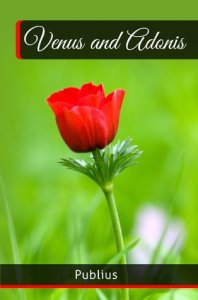 I played a bit of a game this afternoon. I was ready to start a new book and, as I’ve given most of my month to NaNoWriMo, my review requests have gotten little attention. So, I wanted to read a request.
I played a bit of a game this afternoon. I was ready to start a new book and, as I’ve given most of my month to NaNoWriMo, my review requests have gotten little attention. So, I wanted to read a request.
I gave my kindle to my seven-year-old with the instructions to pick her favorite picture from the list. (They were book covers, obviously.) She chose ‘the rose.’ Yes, that’s obviously an anemone, but you try arguing with a seven-year-old.
The author, Publius sent me a copy of Venus and Adonis in exchange for a review.
Description from Goodreads:
The myth of Venus and Adonis is one of the great erotic love stories of world literature. Venus, the goddess of love, falls in love with the handsome young human, Adonis. She plies him with all of her charms but he resists. She kisses him, pushes him onto the grass and climbs on top of him, and makes love to him.
And swift at once the grass and him she pressed.
Then sweetly smiling, with a raptured mind,
On his loved bosom she her head reclined,
And thus began; but mindful still of bliss,
Sealed the soft accents with a softer kiss.
But Adonis says he is too young and that all he is interested in is hunting. Can you imagine a modern man refusing the goddess of love? The love scenes in this myth (that Shakespeare also covered) were as explicit as anything written up to that time.
Adonis goes off to hunt. Venus warns him to stay away from dangerous wild animals like wolves and boars that won’t care about his beauty. But Adonis hunts a wild boar anyway. He spears the boar, but badly. The boar pulls the spear out. It runs the fleeing Adonis down and gores him.
Venus senses the danger and rushes to her lover. She finds Adonis dead. Venus is heartbroken. She sprinkles nectar on Adonis’s pooled blood, and magically appears the red anemone, the “wind flower,” because its petals scatter in the wind.
This Venus and Adonis is a prose poem that tells the story of Randy Maynard, a “blond Adonis” who takes a job with a big bank in San Francisco in 1978. The story follows Randy’s separation from his true love, his seduction by a large corporation and a number of women and includes erotic scenes that are up to today’s standards. As in the original, love and death commingle in fifty shades of grey. The recreation of Seventies office life with a cast of acid-etched characters is reminiscent of Mad Men and provides added levels of intrigue and entertainment.
Review:
I have had this book on my request list for ages. I’ve put off reading it, largely because I didn’t understand what it was supposed to be about. Here’s the problem, I’ve read it now and I still don’t know what it’s supposed to be about. I can tell you what happens, but that’s not the same thing. I just don’t get it. I have no idea what the point or plot of this story actually is. None.
Having now read it, I at least understand what the blurb means. But I don’t see it in the work at all. Maybe I don’t understand banking well enough. Maybe I don’t understand 70s office politics well enough. Maybe I don’t know my mythology well enough. Who knows, but the story’s correlation to the Venus and Adonis myth is pretty weak, if there at all beyond the author’s declaration. I suppose the writer can say it’s based on anything he/she likes. Who has the authority to argue?
Further, the book is presented as erotic. But there are two brief sex scenes. One in which ‘He felt his trouser snake uncoil.’ and another in which ‘With a flurry of her hands like butterflies around his swollen Maypole till his fountain spurted a pool of rich white semen on his belly.’ (That’s how it’s written, BTW. Is that a fragment? It feels like a fragment sentence.) Trouser snake? Maypole? For real? IDK, maybe the author is trying to recreate 1970 language. I hope so.
The writing itself is fine. It’s a little flat, but I got the impression the main character is just skirting this side of clinical depression, so that may be atmospheric and purposeful. I did like the characters, but they had no depth what so ever. Similarly, the limited outlining of family history and a past relationship was nowhere near enough to give this book enough meat to feel satisfying. So, basically I’m ending this book as confused as I started it. It reads well (and it’s short), so if you’re curious give it a try.
